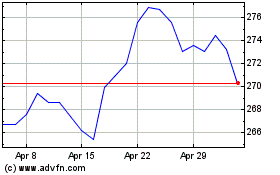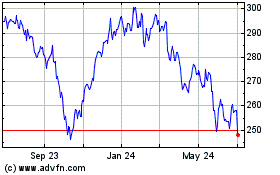By Julie Jargon
For McDonald's Corp., the suggestion that it should spin off its
vast property holdings poses an existential question: What are the
Golden Arches without real estate?
As McDonald's approaches the third anniversary of declining
sales, some analysts have been asking whether shareholders could
get better returns if the company placed its U.S. properties in a
publicly traded real-estate investment trust.
McDonald's has always maintained the importance of owning its
own property. But executives responding to recent queries haven't
ruled out the possibility of spinning off its real estate, with
Chief Financial Officer Kevin Ozan saying last month that it will
consider all financial options to boost shareholder value, and
update investors in November.
Hedge fund chief Larry Robbins, of Glenview Capital Management,
said in a March letter to investors that McDonald's could unlock at
least $20 billion in value if it were to spin off its U.S. real
estate.
Many investors like REITs because they tend to trade at higher
multiples than retail companies and pay little or no tax on their
earnings as long as they distribute most of their profits through
dividends. Macy's Inc. is under similar pressure from activist
investor Starboard Value LP. Darden Restaurants Inc. in June became
the first major restaurant chain to announce plans to transfer
properties into a REIT. Doing so enables companies to collect an
upfront sum that can be used to buy back shares or pay down
debt.
That could make such a move attractive to McDonald's top
management, especially since the fast-food chain's shares--at
$92.87 as of Monday's close--are down more than 10% from their
all-time closing high in April 2013.
McDonald's shares rose 1.6% the day Mr. Robbins issued his
letter.
A number of analysts have since questioned McDonald's about its
intent to do something with its real estate.
"We continue to evaluate opportunities to further enhance value
for all shareholders and addressing our operational issues is our
first and most critical priority," a McDonald's spokeswoman
said.
Publicly traded Arcos Dorados Holdings Inc., McDonald's largest
franchisee, which owns more than 2,100 McDonald's throughout Latin
America and the Caribbean, last month said it is planning to
outright sell or sell and then lease back some of its non-core
real-estate assets, such as office buildings and distribution
centers as part of a broad cost-cutting plan.
But some analysts say the arguments against a McDonald's REIT
far outweigh those for it. For starters, the burger giant derives
huge revenue from its real estate. Rental income from franchisees
accounted for more than a fifth of McDonald's $27.4 billion in
total revenue last year--when overall revenue fell 2.4% and profit
dropped 15%--and represents a growing part of its business. Rent
payments from franchisees have risen 26% over the past five years
to $6.1 billion last year.
Sara Senatore, an analyst at Sanford Bernstein who has studied
McDonald's real estate, estimates its world-wide property,
including the U.S., is worth more than $42 billion. In the U.S.
alone, home to more than 14,000 McDonald's restaurants, she
estimates that the company's real estate is worth between $25
billion and $35 billion. McDonald's current market value is around
$87.5 billion after the recent broad market downturn.
But she and others note that selling off the property would
introduce new costs for McDonald's, which could have to start
paying rent on the roughly 1,500 U.S. restaurants it operates on
its own. "Adding lease costs at a time when there's been a
deterioration in McDonald's fundamentals doesn't make a lot of
sense," Ms. Senatore said.
Creating a REIT also could distract from the agenda of new Chief
Executive Steve Easterbrook, who since taking over on March 1 has
emphasized his desire to rejuvenate operations.
"McDonald's is facing a lot of headwinds, like minimum wage
increases and more competitors," said Bob Schulz, managing director
at Standard & Poor's Ratings Services. "This would be an
additional complication for management's time."Standard &
Poor's in May lowered its credit rating on McDonald's to "A-" from
"A" after McDonald's accelerated a share repurchase plan.
Real estate has been a backbone of McDonald's business almost
since its founding. McDonald's first chief executive, Harry
Sonneborn, reportedly once told investors, "The only reason we sell
15 cent hamburgers is because they are the greatest provider of
revenue from which our tenants can pay us rent."
All that property has attracted outside interest before. Nearly
a decade ago, activist investor Bill Ackman pushed McDonald's to
spin off some its real estate, but other shareholders didn't get
behind his plan and he ultimately dropped it.
Splitting off the real estate would involve other complications.
In some cases McDonald's owns the land and building for its
restaurants outright. In others, it rents the building from another
landlord and subleases it to franchisees. In the latter case,
McDonald's pays its landlords a market rent of about 5% of the
restaurants' sales and then charges its franchisees 10%, according
to Ms. Senatore.
McDonald's franchise-disclosure documents, given to prospective
operators, spell out that structure, saying that the company
applies a finance fee on top of the monthly base rent "to produce
an appropriate return for McDonald's."
"What's reported as rent is really rent plus McDonald's
premium," Ms. Senatore said. A REIT wouldn't be able to charge that
premium, meaning the property would effectively be worth less in a
REIT.
Franchisees, whose relations with McDonald's already are
strained, also likely would balk, said John Gordon, founder of
restaurant consulting firm Pacific Management Consulting Group.
They fear a REIT might have more incentive to jack up rent over
time than McDonald's, which wants to maximize rent but also wants
franchisees to be financially healthy so its business can thrive.
McDonald's sometimes gives rent breaks to franchisees who remodel
or add new equipment, something a REIT wouldn't do, Mr. Gordon
said.
"My prediction is they'll slow roll this forever," he said of
McDonald's management.
Write to Julie Jargon at julie.jargon@wsj.com
Subscribe to WSJ: http://online.wsj.com?mod=djnwires
(END) Dow Jones Newswires
August 25, 2015 05:44 ET (09:44 GMT)
Copyright (c) 2015 Dow Jones & Company, Inc.
McDonalds (NYSE:MCD)
Historical Stock Chart
From Mar 2024 to Apr 2024

McDonalds (NYSE:MCD)
Historical Stock Chart
From Apr 2023 to Apr 2024
